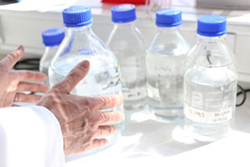GSK
GSK areas of interest
GSK are looking for novel hypotheses, technologies and targets in the following areas:
- Cardiovascular and metabolic diseases
- Oncology and Immuno-oncology
- Respiratory, inflammation and auto-immunity
- Neuroscience, pain, epilepsy and neuropathy
- Infectious diseases
- Rare diseases
- Technology/platform innovation and capability development
- Epigenetics
- Bioelectronics
- Gene Therapy
GSK discovery partnerships with academia
Discovery Partnerships with Academia (DPAc) is a unique way to allow academic researchers in Europe and North America to team up with GSK to work together to translate new therapeutic ideas into medicines that benefit patients. Resources are available to academic researchers for projects that have specific and testable hypotheses related to targets, therapeutic areas or technologies of interest. Further details can be found at www.dpac.gsk.com. For a case study where Cambridge scientists have collaborated with GSK to study HIV replication and screen compound libraries to target novel parts of the viral life cycle click here. Academic scientists can:
- Work alongside drug discovery scientists from GSK
- Access state-of-the-art drug discovery platforms
- Benefit from new research tools to jump start new lines of research and high quality publications
- Access compound collections and screening capabilities relevant to target and disease area
- Receive a financial share in the success of any future medicines
GSK have opened facilities and offer opportunities for academic and industry scientists to work alongside each other in specific areas of interest. These range from sabbaticals, pitching challenges to the academic community to win partnerships with GSK through to open laboratories, and research institutes.
Taking a flexible approach to collaboration
GSK has over 500 research collaborations with academic institutions around the world, including over 60 currently active collaborations in the Cambridge community, across the University, Cambridge University NHS Foundation Trust, LMB and Babraham Institute. Examples include:
- Cambridge GSK Alliance [click here]
- Open-lab for diseases of the developing world in Tres Cantos [click here]
- Immunology Network to connect GSK to academic scientists and novel research [click here]
- R&D open lab for non-communicable diseases in Africa [click here]
- Laboratory space for translational research (e.g. Stevenage Bioscience Catalyst) [click here]
- Discovery Fast Track Challenges via DPAc
- Bioelectronics research network and Innovation challenge [click here]
At the Milner Institute we are keen to facilitate these types of interactions between scientists in Cambridge and industry. For more information please contact Kathryn.Chapman@milner.cam.ac.uk.
Open innovation, compound libraries and resources
Interactions can occur through TCOLF (Tres Cantos Open Lab Foundation) which supports collaborative research with academics in TB, Malaria and Kinetoplastid drug discovery projects in an industrial setting, enabling researchers to make use of GSK’s compound libraries, skills and bespoke facilities in Tres Cantos and/or through co-participation in funding applications to the relevant bodies. Areas of expertise cover screening, medicinal chemistry, parasitology, microbiology, animal models and other key components in the drug discovery process. The chemical structures of 13,500 promising ‘hits’ to stimulate drug discovery research in malaria have been made available to academics to use in their research. Clinical trial data is also accessible for researchers, medical professionals and the public from GSK-sponsored clinical studies [click here].


